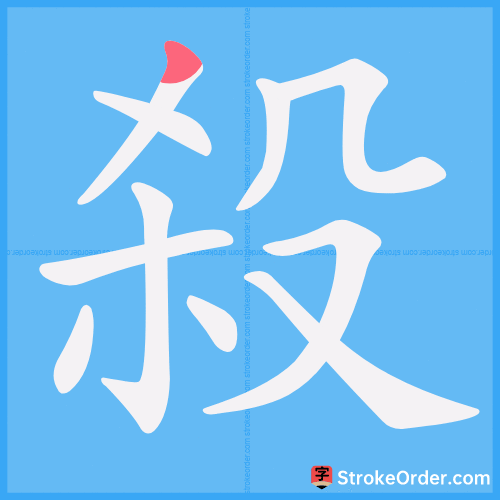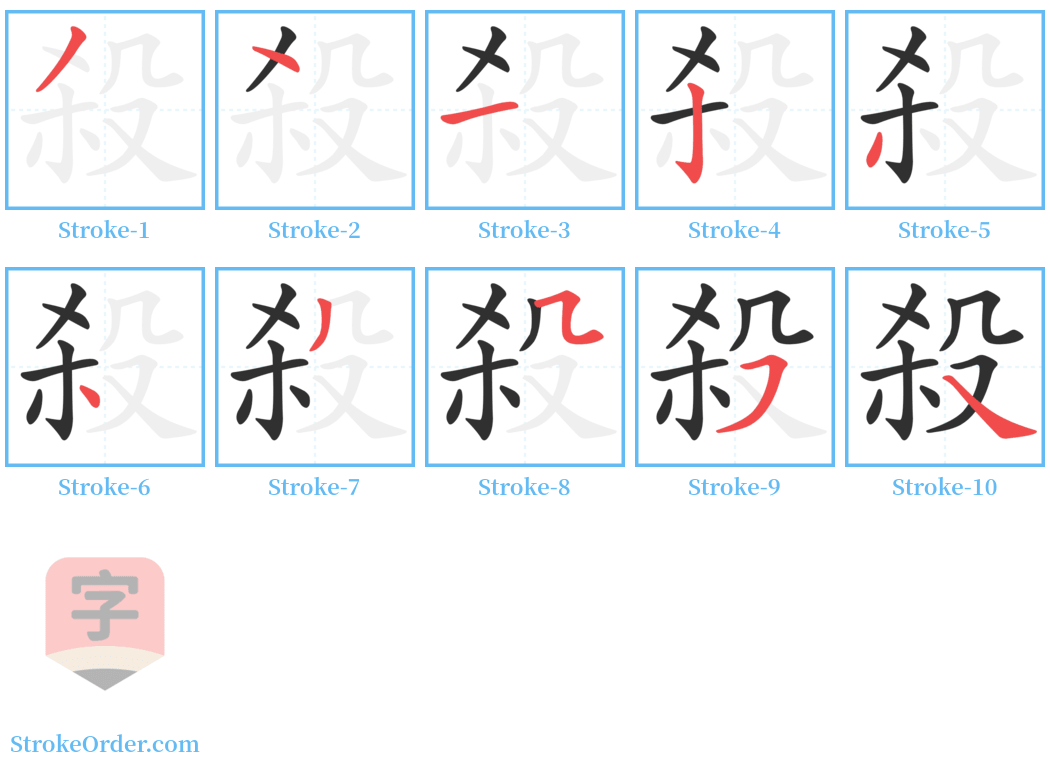殺 Stroke Order
Animated Stroke Order of 殺

Stroke Order Diagrams for 殺

Step-by-Step Handwriting Guide for 殺

Learn to Write Chinese Characters with Video Tutorials
Watch the video of writing the Chinese character "殺", learn the correct stroke order (笔顺) of the character "殺", and master the standard way of writing the character "殺".
Free Printable Handwriting Practice with Stroke Order: 殺
Printable Writing Practice Worksheet of "殺" in Portrait Orientation (Tian Zi Ge)

Printable Writing Practice Worksheet of "殺" in Landscape Orientation (Tian Zi Ge)

Information of 殺
Pinyin
shā
Radical
殳
Strokes
10 strokes
Usage
★★★
Definition
to kill / to murder / to slaughter
殺 shā
(verb)
1. To cause a person or animal to lose life.
Example: 殺生 (to kill living beings), 殺敵 (to kill enemies), 殺雞取卵 (to kill the hen for its eggs), 殺一儆百 (to kill one as a warning to others).
2. To fight or engage in battle.
Example: 殺出重圍 (to break through the encirclement).
3. To reduce or diminish.
Example: 殺風景 (to ruin the scenery).
4. To cause pain through drugs or stimuli.
Example: 肥皂水殺了眼睛 (soap water stung the eyes).
5. To tighten or contract.
Example: 殺價 (to lower the price).
6. To bind tightly or secure.
Example: 殺車 (to tighten the car).
7. Used after verbs to indicate a deep degree.
Example: 笑殺人 (to laugh to the extreme), 恨殺 (to hate intensely).
(Meaning 1) Same as the original meaning ([En.] kill; slaughter)
(Meaning 2) Attack and kill, fierce battle ([En.] fight; go into battle)
(Meaning 3) Wither ([En.] wither)
(Meaning 4) Terminate; contract ([En.] end)
(Meaning 5) Restrain, suppress ([En.] restrain)
(Meaning 6) Spoil; decline ([En.] spoil)
(Meaning 7) Draw out ([En.] draw out)
(Meaning 8) Chess term. Refers to checking or defeating the opponent. ([En.] check)
(Meaning 9) Bind tightly. ([En.] bind tightly)
(Meaning 10) (Dialect) Incite ([En.] incite)
(Meaning 11) Hammer down ([En.] hammer down).
殺 shā
(noun)
Hunting prey ([En.] bag)
Example: 獵獲物 ([En.] hunting prey).
殺 shā
(adjective)
1. Stiff, unchangeable ([En.] inflexible).
Example: 殺定 (fixed rules).
2. (Colloquial) Damn it! ([En.] damn it!).
Example: 殺千萬 (damn the consequences).
3. Cold; gloomy ([En.] gloomy).
Example: 殺節 (a bleak and cold time).
4. (Dialect) Near to... ([En.] next to).
Example: 殺黑 (just dark).
殺 shā
(adverb)
1. Used after a predicate to indicate the depth of degree ([En.] in the extreme).
Example: 白楊多悲風,蕭蕭愁殺人 (the poplars moan in sorrow).
2. Very ([En.] very). Used before a predicate.
Example: 殺狠 (very fierce).
副词: Extremely, very. Same as 煞.
Example: 愁杀人 ([En.] sorrow kills).
元代 张养浩《咏江南》: 画船儿天边至,酒旗儿风外颭,爱杀江南 (the painted boat reaches the horizon, the wine flag sways in the wind, love for Jiangnan).
名词: Degree of difference.
Example: 《礼记》: 其族食世降一等,亲亲之杀也 ([En.] his clan's food status descends a rank, it signifies closeness).
动词: To reduce or cut.
Example: 《周礼》: 若食不能人二釜,则令邦移民就谷,诏王杀邦用 ([En.] if food cannot feed two families, then the state should move to the grain, and the king shall limit the state's use).